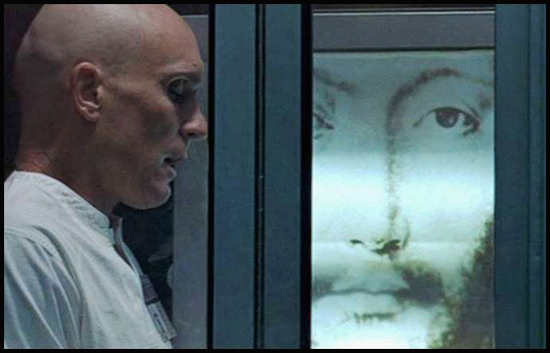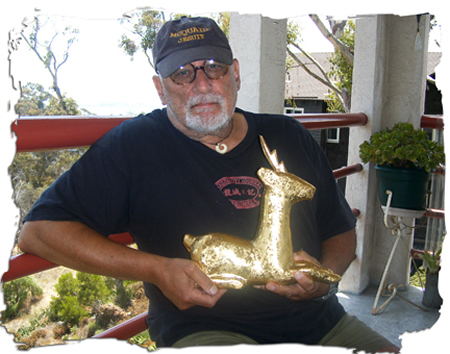This is a reprise of my 7.27.2009 posting in honor of the U.S. Supreme Court’s “Hobby Lobby” decision where apparently what people believe–in this case an employer’s beliefs–trumps even a woman worker’s health concerns. The Court doubled down with another decision that removed the 35 foot zone between snarling and often armed anti-abortion intimidators and women’s clinics so that the creds can better enforece their beliefs upon others. Where will it end? Take a look over toward Afghanistan, Syria and Iraq.

THX (Robert Duvall) confesses his improper use of drugs to his rather insouciant Deity American Zoetrope/Warner Bros.
There is a scene in the futuristic fiction film by George Lucas, THX1138, in which Robert Duval, as the title character, enters a sort of phone booth in which there is a large image of a person with a slightly-Asiatic face that is the amalgam of Jesus, Buddha, and Mr. Rogers. This god, it turns out, is projected from a studio elsewhere, to these remote “confessionals,” but is merely a large photo—God as the Wizard if Oz. When supplicants enter the booth the local image intones an audio loop of ambiguous general responses to whatever problem or need is presented. They might come from any politician—exhortations to “serve the state by increasing production and increasing consumption.” It is the sort of mindless idolatry that we find in religion anywhere.
Lucas was implying that we will probably concoct some form of deity and religion even in a distant future, but the need to pray, confess and worship need have nothing to do with the likelihood that there is nothing and no one out there to hear or care. That lonely, dismal prospect is just too much for many people to bear and they will seize alternative that there is a god who cares about us and offers us “salvation” and eternal life, if we will just follow the rules set down in some old, inconsistent and often silly scriptures, and obey the interpretations of some men who wear silly hats and like to abuse women and children. The credulous will also tell people like me that, if I don’t get some faith, God will be pissed off and throw my sorry ass into hell for eternity. It would not matter if I led a life of rectitude and practiced tolerance and charity toward my fellow humans; disbelief negates all of that. Theirs is a god who will not only “have no other gods before Him,” but has a deep need for acceptance.
The First Commandment was always somewhat of a puzzle to me. Mind you, God put it first among the Ten Commandments that He must be accepted at the “one and only” god. In the Old Testament he wasn’t happy when the Hebrews took up with “false gods.” (Doesn’t this guy have any friends to tell Him He should get over this ego problem He has?) I confess that I, too, went through a period in which I worshipped a false god. Like the Hebrews I fell under the thrall of the idol of a golden cloven-footed animal, a gilded fawn. All my fawning over the golden fawn never answered my prayers for a new bike, so I dumped him. I think it was a good idea; God punished the Hebrews pretty bad for their false idol. What can they possibly had done so wrong to deserve the holocaust he gave them? It might be safer to disbelieve.

Author and the Golden Fawn God that he worshipped between ages 12 and 14, until the Fawn failed to grant Jim the bicycle that he wanted and Jim dumped Him. Now they are just friends. . . although with the recession and the escalating value of gold . . .
My disbelief in God is what Christian evangelists would probably call a “lifestyle choice” (by which they really mean I will burn in Hell for it). I wasn’t born a theist, the way gays are born gay. That’s because I learned to believe in God once—at least I think I believed—or I believed that I was supposed to believe in God. Didn’t everybody? It was part of my cultural inheritance, the way it is for all religions. (This was before I was old enough to go to café’s, which is where agnostics and atheists go to worship the sacred little roasted bean.) How do you not just start taking the existence of God for granted when everybody around you is shouting “Oh, my God!” (frequent orgasmic utterance), or muttering “Goddammit!” (failure to achieve orgasm), and such? Who are they talking to, anyway?
One may not be born a theist, but in this society one is born into theism. It is easier to be a theist than not. There is very little work to being a theist; that’s not only because believing is a hell of a lot easier than knowing, but because, to be a believer, you usually just have to choose only one of a small number of books—the Bible, Quran, Torah, Bhagavad-Gita, The Book of Mormon, Dianetics for Dummies . . . whatever, and get with the respective program, which begins by feeling metaphysically superior to those who chose the other books.
To be a non-theist requires a lot of work, a lot of it rather lonely, since (other than cafés) un-believers do not have churches in which to congregate and reassure ourselves about how pious—rather impious—we are. Libraries, laboratories and lecture halls are closest to what we have for churches, where we have to read rooms of books on science, philosophy and history just to refute one fanciful Book of Genesis. While those other guys are praying, worshiping and chanting, and watching The Passion of the Christ (What? Again?), we are reading, conducting experiments, and wandering in the lands of Truth, Hypothesis, and Doubt. Apostasy is a hard earned degree, not just a baptismal dunking.
But, as I said, I was once a theist (of sorts) and not because I chose to be. I did not choose to have water poured on my cute little head when I was only weeks old and have “God parents” accept Jesus and renounce Satan on my behalf, the Church’s version of waterboarding.* I did not choose to be sent into the clutches of the Sister of St. Joseph. I wasn’t born Roman Catholic; I was born into Roman Catholicism. And my spongy little mind languished in innocent, cheerful, reflexive credulity from Christmas to Easter and Easter to Christmas, blissfully unaware of the fragility and silliness of my metaphysical “certainties.”
The secret of success of religions is selling belief in not just God, but in the afterlife. The notion of salvation allows religions to promulgate notions that the present life might not only be endured, but resignation to its sufferings, or even submission to martyrdom, can guarantee an eternity in heaven. How else could the Pope ride through the faithful in Africa and South America in is “Popmobile,” spouting assurances that it is OK that they are oppressed by the corrupt regimes that is Church usually supports, OK that that are suffering the poverty that so contrasts with his own radiant opulence, OK that the sickness and hopelessness of the children, and the abuse of their women, and the AIDS that is spread because the Church regards condoms as “birth control,” will all be more than compensated by a comfortable eternity—all because of their resignation to “the will of God.” The same promise is made or implied by the other major religions. The same hope born of fear that all these faiths rely the existence of which rests not on an ounce of proof, but on the selling of a mass delusion.
In the end, maybe Rick Blaine (Humphrey Bogart) in Casablanca said it most succinctly, when recognizing that the war was more important than his love affair with Ilsa (Ingrid Bergman) he reluctantly tells her before sending her away, “. . . it doesn’t take much to see that the problems of three little people don’t amount to a hill of beans in this crazy world. Someday you’ll understand that. Not now . . .” Maybe everything doesn’t amount to even a “hill of beans.” In the end, it all comes down to God; either He’s there or He’s not. But if you believe that He’s there don’t try to sell me the bullshit that you believe so because the “proof” of his existence is that, as I read one argument on the Internet, if you took apart a television set it all its parts and put them in a bag, you could shake that bag for 100 billion years and it wouldn’t form into a television set. This is the “intelligent design” argument that “God is a TV repairman.” I actually tried this experiment myself with an old television set. I could not, of course, afford 100 billion years, but in six months I was able to shake the television set parts into a toaster, a fish tank and a personal vibrator. I don’t think God could do much better.
___________________________________
© 2009, James A. Clapp (UrbisMedia Ltd. Pub. 7.10.2014)
